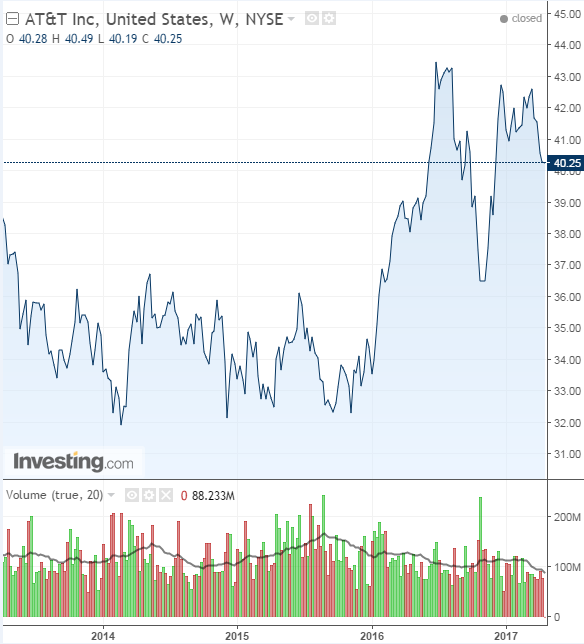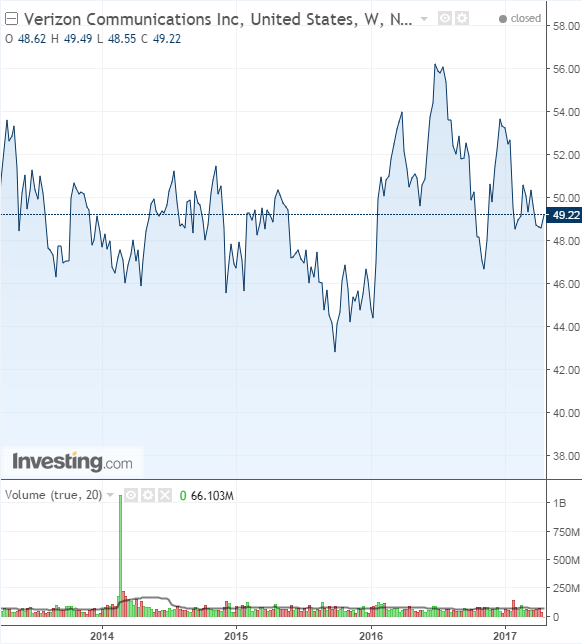by Clement Thibault
AT&T (NYSE:T) and Verizon Communications (NYSE:VZ), two American multinational telecommunication conglomerates, are set to report earnings in the next few days. Verizon will report its Q1 2017 earnings on Thursday April 20 before the market opens, while AT&T will report Q1 '17 earnings on Tuesday, April 25, before the open as well.

AT&T is expected to report EPS of $0.75 on $40.7 billion in revenue.

Wall Street's consensus for Verizon is $0.98 in EPS and $30.5 billion in revenue.
In the past, telecom behemoths such as AT&T or Verizon provided communication services primarily in the form of voice, text, and internet landline connectivity. However, these companies—as well as the sector in which they operate—have evolved in recent years, and are now focusing more on everything wireless, providing business solutions, even content, in the cases of both AT&T and Verizon.
We appear to be at a crossroad for telecom companies; the shifting business environment is providing telecoms with opportunities through which to expand beyond their original core as never before. For this reason, now may be the exact right time to take a long, hard look at two of the sector's giants.
1. Lackluster Stocks, Stellar Dividends
One thing to immediately acknowledge: the performance of both stocks has been, to put it mildly, lackluster over the past four years. In April 2013, Verizon traded within a range of between $48 and $54 dollars a share. Yesterday, Verizon closed at $49.22. Thus, very little to no capital appreciation at all over the past four years.
AT&T's story isn't all that different. It traded in a range of between $36 and $39 a share during the same month in 2013. It closed at $40.25 last night. Any investor who bought these stocks just for the capital gains has, by now, been sorely disappointed.
However, savvy investors buy and hold shares of these two companies not for the share price movement, but rather for their stellar dividends. AT&T currently yields a hefty 4.86% which it has been maintaining and growing for the past 32 years. This exemplary payout history has made the stock a Dividend Aristocrat, the designation given to S&P 500 stocks that have increased their dividends consecutively for 25-plus years.
Verizon currently yields 4.73%, and has consistently grown its dividend for the past 10 years. So, while shares didn't appreciate, stakeholders were still rewarded for their investment. That's likely one of the reasons Warren Buffet continues to retain shares of the stock.
2. Business Performance
Verizon's business is divided into two segments. "Wireless," which includes the company's wireless network, as well as phone and data divisions, and "Wireline" which consists of broadband and fiber operations, including Fios – Verizon's fiber optic network.
The "Wireless" segment, accounting for over 70% of Verizon's income, has struggled throughout 2016, registering lower operating revenue (89 billion vs. 91 billion, -2.7%) and lower operating income (29.9 billion vs 29.8 billion, -0.4%), though that was partially offset by lower operating expenses. However, the trouble is more pronounced when looking at the slow-down in new customer expansion. Verizon added 2.28 million customers in 2016, compared with 4.5 million in 2015. The churn (percentage of canceled subscriptions from within the entire customer base) has also popped—from 0.96% in 2015 to 1.01% in 2016, including an especially bad quarter just recently when churn increased to 1.10% in Q4 2016.
While "Wireline" suffered from a 2.3% drop in revenue during 2016, from $32 to $31.3 billion, it actually returned a $40 million profit on the year, after losing $521 million during the previous year. Customer additions were also on the decline: from 677 thousand net adds in 2015 to just 317 thousand in 2016, 53% less.
AT&T's business is divided into three segments: Business Solutions, Entertainment Group, which includes pay TV and high speed internet, and Consumer Mobility, which is the equivalent of Verizon's "Wireless" segment. The Business Solutions segment remained flat for the year, with wireless services and "strategic services" (VPN and other internet services) picking up the business leaving AT&T legacy voice services which are also part of the Business Solutions segment.
The Entertainment Group got a boost from the DirecTV integration in Q3 2016, so a YoY comparison is harder to make, but early numbers show growth of 3.4% in video entertainment revenue.
The Consumer Mobility segment is suffering even more than Verizon's equivalent division, with a 6.5% decline in revenue over the past year from $35.5 billion to $32.2 billion. However lower operating expenses more than made up for the losses, as the segment finished with $9.8 billion in income, +0.1% over last year. Net customer adds are also down, from 463 thousand to 359 thousands, -22%.
3. Acquisitions and Growth
As we've shown above, both companies have been struggling to grow organically over the past few years, a key reason for the inevitable share price stagnation. Consequently, in pursuit of new routes to profitability, they've both been on acquisition rampages.
Notable deals for Verizon include the purchase of AOL in May 2015, for $4.4 billion; Yahoo (NASDAQ:YHOO) in July 2016, for $4.8 billion, and Fleetmatics (a fleet management software company) in August 2016 for $2.4 billion.
Notable deals for AT&T include DirecTV, acquired in July 2015 for $48.5 billion; Time Warner in October 2016 for $85 billion ($108 billion including debt); and Straight Path Communications (for its 5G licenses) earlier this month for $1.6 billion.
The difference between the two companies becomes clearer when you consider their recent acquisition history. Verizon is dipping its toes into media and advertising markets by buying companies that are mostly past their prime, hoping for a good deal on still-valuable assets such as brand names (although a general corporate rebranding is also in the works). With its recent acquisitions, Verizon will own The Huffington Post, AOL, TechCrunch, Tumblr, Flicker and more.
AT&T on the other hand is betting big, and going all in on content—including television, streaming and video content. These moves should make every AT&T investor nervous. The company is adding a considerable amount of debt to its books in order to try and create a media empire, by purchasing control of both the content and distribution sides of the business.
It's an integrated approach that AT&T executives believe will succeed over time. For example, the acquisition of Straight Path, while small, could be what allows AT&T to control the 5G space and would benefit all of its other endeavors too, since it would allow AT&T to transfer data, such as video, a hundred times more quickly than before.
Comparing the ambitions of each company, it appears that AT&T's moves have the bigger potential upside, though of course that also comes with greater risk. AT&T has $9 billion in debt due every year for the foreseeable future, but its massive Future Free Cash Flow of $26 billion should be able to cover this as well as the dividend, which cost the company $11.8 billion in 2016. This would still leave over $5 billion for the company's use after those two major expenses.
Conclusion
Of the two companies, AT&T is the one we like best. It's more diversified, has a stronger business customer base, is less affected by the price war going on among retail phone and data service providers, and overall simply has more room for top and bottom line growth in the near-, mid-, and longer-term.
However, a company is only as good as the price you pay for it. Luckily, though the stock is priced at nearly its all-time high, AT&T's valuation isn't excessive. It currently has a P/E ratio of 19, a Price-to-Book ratio of 2, and a Price-to-Free Cash Flow of 14. Surprisingly, both AT&T's Price-to-Book and Price-to FCF are below the industry average.
Verizon's P/E is 15, lower than AT&T's, but its Price-to-Book ratio is 8.8 and its price to FCF is 38.8. Note however, that Verizon recently changed accounting methods, making its numbers look worse than they actually are.
Still, AT&T is the better value considering its growth potential. Taking everything into account, we'd give Verizon a hold, though AT&T is most definitely a buy. Our ideal entry point for AT&T would be $37, but everything under $40 seems reasonable.
